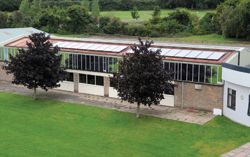Design engineer at Buderus, Stefan Gautsch, explains the potential savings in fuel costs and carbon emissions achievable with solar thermal installations.
Investing in a new heating and hot water system to replace an existing one which is more than 10-15 years old will undoubtedly deliver significant savings in running costs. It could also prove more financially beneficial for a number of businesses as the Carbon Reduction Commitment (CRC) has now come into play for around 5,000 commercial buildings throughout the UK.
Utilising renewable heating technology that works in conjunction with a condensing boiler system is proving to be a popular way of maximising efficiency and economy for many businesses and institutions.
In many commercial situations an investment in renewable energy generally means opting for solar thermal as the most practical and cost effective solution. All renewables, by their very nature tend to require space, either for ground works, storage or panels. However, almost all commercial buildings have an accessible and largely unused roof area where a solar installation could be placed.

Solar thermal collectors at Oxford Brookes University
Used together, solar and condensing boilers make an ideal partnership. They combine available energy from the sun, with a fuel efficient boiler to satisfy any additional heat requirements.
A solar thermal system is primarily designed to meet hot water requirements but, in the right type of low temperature system, can go some way to providing backup for the space heating within a building. Up to 60 per cent of the domestic hot water requirement during the year can be met by the panels drawing thermal energy from the sun. A high efficiency or condensing boiler will be necessary to meet the majority of the heating load and to supplement the domestic hot water provision during the winter months.
Sizing is Everything
Fundamentally, each solar system must be designed and accurately sized to take into account hot water demand, heat requirement, insulation properties and fabrication of the building. After this there are three main reasons why solar should be considered for the hot water and heating specification - ethics, independence and economics.
While saving money and reducing the dependence on fossil fuels are key issues, we are increasingly finding that reducing carbon emissions is the key factor in the specification of solar systems. This must be an aim for every responsible business as we all have to play a part in protecting the environment for future generations and the public sector in particular is tasked by government to lead the way in lowering the carbon footprint of its buildings.
Whatever the weather
By referring to official records on weather patterns it is possible to provide realistic assessments of estimated fuel usage and fuel savings from the installation of solar collectors, either as a separate system for water heating or as part of a complete integrated heating and hot water solution. A roof covered in solar panels is also a highly visible way of demonstrating a real commitment to reducing fuel consumption and therefore reducing carbon emissions.
To achieve this result however, it is vital the system is correctly sized, controlled and commissioned. Accurate sizing requires a realistic assessment of the hot water demand, which can be achieved by installing hot water metering before designing the solar arrangement.
Maximising efficiency
To maximise carbon reduction, it is also important to avoid wasting the energy, which has been generated. This means ensuring the secondary thermal storage and circulation system is properly insulated and effectively controlled. The fabric of the building is also an important factor here, and is often where the biggest heat losses can occur.
There is a tendency for solar installations to be oversized 'to be on the safe side' but this is not efficient as heating the domestic water beyond the requirement is a waste of energy. It could be preferable in some cases to slightly reduce the output from the solar system and blend this with output from the boiler thereby boosting the temperature of the hot water to the required levels.
The overall efficiency of the system is very much down to the details of its design. The use of sophisticated controls for instance, coupled with other features such as flow regulators and low flow taps in the domestic hot water system, will all contribute to the savings. Provision of storage for the heat energy generated by the solar collectors is also vital, and will help to ensure reserves of heat are still available at times when levels of solar irradiation are lower, such as during overcast or very cloudy days.
Maximising energy efficiency in order to affect carbon footprint and fuel cost savings requires accurate assessment of the requirements and circumstances of each installation. If you get all the considerations right the combination of solar and high efficiency boiler can tick all the boxes.
For more information about Buderus' range of solar thermal systems and condensing boilers for commercial installations, visit:
www.buderus.co.uk.